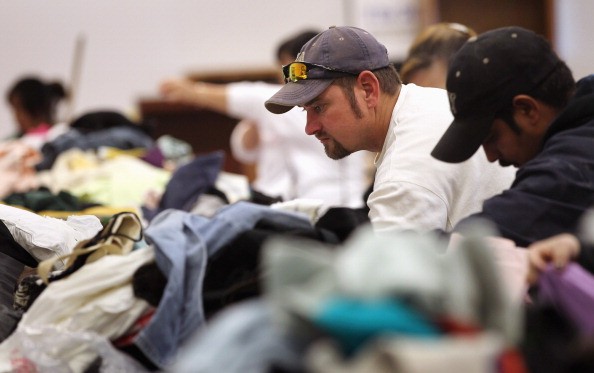Jen Karlen, a Rhinelander Goodwill Customer Experience Team Leader, sees promise in every donation she receives at Goodwill since even one piece of clothes given has a ripple effect.
"It's weird to imagine that a t-shirt can be donated, but if you follow the cycle that it goes through here, that t-shirt benefits a lot of people," Karlen explained.
Karlen takes satisfaction in promoting a sustainable purchasing choice; the majority of materials used to make garments end up in landfills, but Karlen is working to balance it out.
Thrift stores give items another chance
 (Photo : John Moore/Getty Images)
(Photo : John Moore/Getty Images)

"I mean, we save 50 to 55 million tons of goods from landfills every year," Karlen explained via WJFW.
She felt that shopping at a secondhand store, such as Goodwill, benefits her in more ways than one.
That provides employment, training, skills, and money to help fund each and every one of these programs.
Twice is Nice Consignment Store is another Rhinelander establishment that focuses on giving back to the community.
"It's excellent for the community because it's another area where people can save money," said Marilyn Towne, Store Leader.
People with little income, according to Towne, benefit the most from the shop since it allows them to bring in stuff and maybe earn money back if they sell.
It's exciting for tpeople, because it shows that they're not only helping someone in the community who may need something and saving money in the process, but they're also benefiting themselves.
Both Goodwill and Twice is Nice help to make the community and the environment better, while also giving individuals something to smile about every day.
Items they no longer need will help build up somebody else's life, and not just one life, but they will touch and touch establish careers, skills, employment, and then somebody else gets to enjoy it and it isn't just sitting in a landfill someplace.
Also Read: The Role of Businesses in Environmental Sustainability
The Benefits of Sustainable Shopping
Sustainability is a significant aspect of the corporate sector.
According to the definition, sustainability is the ability to persist over a lengthy period of time, as per ecogreenlove.
This might refer to a variety of things, as the definition will vary based on the business.
The relevance of sustainability in fashion is deeply based on the longevity and quality of clothing, as well as the impact of the manufacturing process on the environment.
A fashion firm with a sustainable manufacturing process will help both the environment and its customers.
One of the many benefits of purchasing with a sustainable company is knowing that workers are treated with dignity.
This approach stands in stark contrast to some fast fashion firms that have been accused of modern slavery for recruiting employees without a visa and paying them less than the minimum wage with no benefits.
Staff is likewise subject to sustainability standards since many businesses are committed to safeguarding and investing in their employees.
This makes employees feel comfortable and secure, increasing their likelihood of staying with the firm, working hard, and providing the finest service to clients.
The fashion business is one of the top 10 polluters and garbage producers. Globally, there are 13 million tonnes of textile waste, 95% of which could have been recycled or repurposed.
These substantial statistics explain why many businesses have made it their mission to cut greenhouse gas emissions and implement recycling methods.
Sustainable brands limit air pollution and strive to make apparel as long-lasting as possible in order to reduce trash.
This entails investing in high-quality, organic materials that use fewer chemicals and consume less.
This style of apparel is frequently available secondhand or may be converted into an entirely new product.
The bulk of sustainable businesses uses organic and raw resources that are fully natural and safe, with little to no environmental effect.
Organizations that use raw resources limit the amount of pollution in the atmosphere, therefore saving the environment and people's health.
Fashion firms are a wonderful illustration of this since they are switching from fleece to merino wool, a silky, itch-free fiber.
Unlike fleece, which contains microfibres (small bits of plastic) that contaminate rivers when washed, merino wool is devoid of any plastic components.
Merino wool is also often supplied from organic sheep farms free of cruelty and chemical usage.
Related article: 6 Sustainability Innovations That Might Just Change the World
© 2024 NatureWorldNews.com All rights reserved. Do not reproduce without permission.

![Tsunami Hazard Zones: New US Map Shows Places at Risk of Flooding and Tsunamis Amid Rising Sea Levels [NOAA]](https://1471793142.rsc.cdn77.org/data/thumbs/full/70325/280/157/50/40/tsunami-hazard-zones-new-us-map-shows-places-at-risk-of-flooding-and-tsunamis-amid-rising-sea-levels-noaa.jpg)



